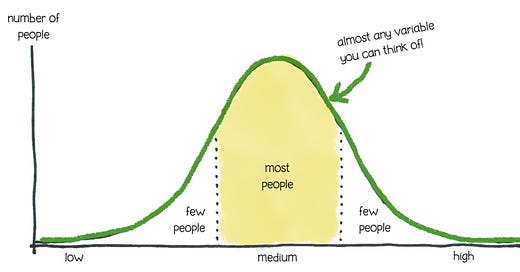A world designed for high stamina people
Exploring the fallacy of Type-A behaviors as necessary for success
Why are we here today? I want to explore the narrative that you must be ultra high stamina (Type-A) to succeed, and understand why we sidestep the more common examples of extraordinary things being accomplished without it. Next, I will flag the risks it poses to people who adopt that high-stamina mindset and are trapped in organisations with a culture based on it. Lastly, I’ll do my best to argue for an alternative model of thinking and being. One that is less mediatised, less Hollywood-esque, but much more sustainable (if I may borrow the ESG nomenclature).
Caveat: I am by no means trying to generalise; I understand that not all ecosystems suffer from this ‘stamina fallacy’. However, I have encountered enough versions of it to deem it a relevant topic.
Let’s dive in, shall we? It’s a long piece, so buckle up folks.
I must start with a definition (eew). What is a Type-A personality? Look for high levels of competitiveness, ambition, time urgency, and an extreme drive for achievement. These people will sacrifice most things to succeed: sleep, time with loved ones, etc. A few usual - and famous - suspects: Oprah Winfrey, Margaret Thatcher, Steve Jobs, Michael Jordan, Ridley Scott, Shonda Rhimes, etc., etc.
They’re demanding, perfectionists, work at a rapid pace, and their sense of urgency means they can become impatient and hostile when things do not go as planned. Does that ring any bells for you?
Two crucial distinctions:
ONE/ There are Type-A personalities and Type-A behaviours, which are two widely different things. I've met and worked with true Type-A personalities: they're like machines—they never stop and never seem to need to. They have a seemingly endless pool of stamina and energy to tap into. These people represent a minuscule subset of the population, what they call the ‘tail of the curve’ in statistics. If I try to adopt Type-A behaviour, I'll burn out (I know because I did). I'm incredibly driven, but not to that extreme level.
Source: here
TWO/ Type-A behaviours (whether natural or adopted) do not guarantee success or performance. I could not find any research demonstrating a correlation. However, I did find a correlation between being Type-A and having heart conditions. You don’t need Sherlock Holmes’s insight to understand the how and why: more stress, pressure, never-enoughism, etc. etc.
And this is what I find spectacularly annoying: Type-A personalities are not only glorified and rewarded, they are inaccurately touted as necessary to succeed. Why? It probably entered our consciousness because of the salience bias (thanks Eric) - a cognitive tendency to focus on the most noticeable and striking information which distorts our perception of reality. It’s much more interesting to read about Elon Musk sleeping under his desk for weeks to ‘save’ Tesla than more normal behaviours. Especially if there are ‘billions’ involved.
Do you remember Suits and Grey’s Anatomy? I spent hours in front of these shows. Did you notice that everything happens to these characters in the workplace? All the drama, all the love affairs, all the growth. I’ll never forget how Dr. Bailey went into labour whilst performing surgery, and kept on working whilst telling her baby to ‘stay in’ until she finished. It would have been hilarious if it wasn’t utterly bizarre. And I’m a huge fan of Shonda Rhimes - the writer and producer of the show; she’s a master of her craft and pushed a lot of socio-political agendas with her impeccable storytelling. But let’s be real: most of her characters are Type-A workaholics defined by what they do. ‘Suits’ is much worse (because it pushes tight dresses and high heels for female lawyers). These shows glamourised workaholism and it messed with my millennial consciousness and festered. That’s why we love to snuggle in front of Friends and Seinfeld, I guess.
Grey’s Anatomy cast - that show is a whole era of one’s life :)
This drive for success is mirrored in mainstream and social media. The below was posted on LinkedIn by a former CEO turned podcaster/influencer:
Source: LinkedIn
There is a plethora of that (sh*t) floating around. And don’t be mistaken: whether you believe in it or not, this content is mind-shaping. You can ignore it if you wish, but it is quite pervasive, and if you’re not careful you will feel lazy for wanting to relax after a long day (instead of pushing stronger, harder, farther). Many entrepreneurs eat up that fallacy (I know I did).
This post pretty much says that the guy is looking to hire Type-A personalities only. This brings me to my next point: exploring what it means in the workplace. There is this belief that in hyper-competitive ecosystems, the rule to succeed is to deploy relentless energy and keep moving forward. And it’s probably true to a certain extent (to what extent? Who knows).
Here is how it goes: the founder is Type-A - or acts like it- and creates a successful business (good for her/him). Founders then extrapolate those Type-A traits and make them the key to their success (ignoring other important factors). Therefore, only similar psychometrics get hired. If the business grows, that becomes the cult(ure).
As far as I can tell, this strategy leads to three issues:
1) Type-A individuals are rare; but crucially: organisations do not need that kind of intensity from every member—it becomes counterproductive.
2) When organisations are set on recruiting high-stamina people, what you end up having are people pretending to be Type-A or lying to themselves into thinking that they are. And they will end up burning out. Or develop other symptomatology: panic attacks, IBS, or more serious illness if they stay long-term.
3) The worst part is that we miss out on or ‘depotentialise’ great performers simply because they don’t fit the productivist energetic mould.
This harmful productivism happens in the creative world but seems less pervasive: Oscar-winning Cillian Murphy swears by sleep and reading; Eminem would clock in the studio at 9 am, take a lunch break at 12 pm, and leave at 5 pm. In science, you’ll also see examples of people who respect their ‘nature’ and their needs: Einstein slept 10 hours a day, Darwin worked for 4 hours and walked the rest of the time.
This brings me to my last point: people with normal schedules and stamina can, have and will produce extraordinary results. We see less of it because of the aforementioned salience bias. Here is a thought experiment: imagine organisations where people get to work while somewhat respecting their nature, their needs, and their energy fluctuations. Imagine them creating valuable high-quality output within ‘human-friendly schedules’. Now, imagine allowing yourself to operate on that basis. Does that feel uncomfortable? How would you go about it? Would that feel like ‘indulging’ or perfectly normal?
I wonder if organisations that are less neurotically bent on productivism for the sake of it make fewer mistakes, create more beautiful things, and have a better impact on society. Simply because their people have headspace. I don’t know why I keep thinking of Pixar writing this.
High-stamina cultures confuse us and make us feel less when we are so much more. If you’re a recovering productivista (like me), it requires a lot of focus not to get fooled, so I don’t know—get yourself a cuppa tea. And DO you.
Until next time my friends,
Lina
Not that you care, but I struggled to write this piece. I found it disgustingly difficult to articulate my ideas in a way that a) flowed well, b) made sense, and c) was somewhat intellectually sturdy. I'm not sure I managed, but I did my best.







Love this article.
I'm currently exploring 'building resilience' and I completely empathise with your closing statement as I'm also struggling with my topic. In my case I think the challenge stems from the fact that there are +/-s and nuances in the interpretation and application of 'building resilience'.